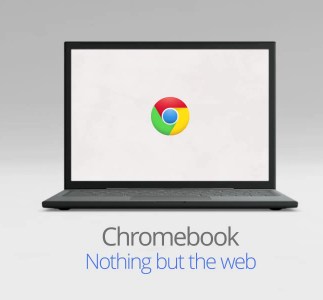
Sundar Pichai, Google’s VP of product management for the Chrome web browser and Chrome OS, gave a quick overview of what to expect from Chromebooks today at the company’s I/O developer conference.
[aditude-amp id="flyingcarpet" targeting='{"env":"staging","page_type":"article","post_id":259127,"post_type":"story","post_chan":"none","tags":null,"ai":false,"category":"none","all_categories":"business,","session":"A"}']Pichai describes Chrome OS as “nothing but the web.” He says that the advantages of Chromebooks over traditional laptops include instant-on capabilities; always being connected to the web with built-in mobile broadband; an all-day-long battery; the ability to access files from anywhere; and built-in security capabilities.
Most importantly, Chromebooks will get faster over time, since they will automatically download system and app updates. That flies in the face of what consumers normally expect from their computers, which typically slow down thanks to malware, program bloat and the like.
AI Weekly
The must-read newsletter for AI and Big Data industry written by Khari Johnson, Kyle Wiggers, and Seth Colaner.
Included with VentureBeat Insider and VentureBeat VIP memberships.
Since many have been asking about Chrome OS’s offline capabilities, Pichai confirmed that the company is developing offline versions of Gmail, Google Calendar and Docs. He also reiterated that there are plenty of apps on the Chrome Web Store that work offline. Popular services like Hulu and Netflix will work out of the box, Pichai said (although I have no idea why they wouldn’t).
A Google representative also showed off some improvements made to Chrome OS since the CR-48 prototype notebooks began testing last year. The file browser is less confusing, and more similar to Windows Explorer now. Chrome OS also supports sending files directly to cloud services like Picasa Web albums and Dropbox. The OS can also handle music and video files easily.
Pichai went on to unveil two new Chrome OS devices from Samsung and Acer. The Samsung Chromebook features a 12.1-inch display, 8-second boot times and an 8-hour battery, while the Acer model offers a smaller 11.6-inch screen and 6.5 hours of battery life. The Samsung model will cost $399 for the Wi-Fi only version, and $499 with 3G connectivity, while the Acer model will sell for $449. Both Chromebooks will be available online from Best Buy and Amazon on June 15 in the US. They will also be launching in the UK, Germany, France, Spain and Italy at the same time.
Pichai said that the company has worked to make sure the trackpad problems of the CR-48 won’t reoccur with the new Chromebooks. Additionally, both the Samsung and Acer Chromebooks feature dual core processors, which will offer a substantial speed bump over the CR-48’s aging single core chip.
In addition to traditional the retail model, Pichai confirmed the rumored Chromebook subscription models for businesses and schools. Subscriptions will include the Chromebook hardware, web console, full support, and automatic hardware upgrades for $28 a month for businesses, and $20 a month for schools.
VentureBeat's mission is to be a digital town square for technical decision-makers to gain knowledge about transformative enterprise technology and transact. Learn More
